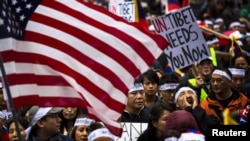The United States is deeply concerned about the Chinese government’s policies in Tibetan areas that have created tensions and threaten the distinct religious, cultural, and linguistic identity of the Tibetan people.
In early December, a Chinese court reportedly sentenced eight Tibetan medical students to five- year sentences for participating in a protest against the marginalization of the Tibetan language and culture, and calling for equal treatment by the Chinese government of all people, including minorities.
The protests followed the distribution of a government-issued booklet that reportedly denigrates the Dalai Lama and those who have self-immolated. The booklet also reportedly promotes the Chinese government’s latest push to implement its bilingual education policy in Tibetan schools, a move seen as an attempt to weaken Tibetan cultural identity.
Some 90 scholars of Tibet at universities and scholarly institutes around the world have signed an online petition to Xi Jinping, the new leader of China’s Communist Party, stating that in recent years Chinese government “authorities have been trying to institute new measures that eliminate or severely restrict the use of Tibetan as the language of instruction in Tibetan-speaking areas.”
The petition describes the Tibetan language as Tibetan culture’s “fundamental support,” and notes that it is “seemingly marginalized and devalued in the [Tibet Autonomous Region] and in various other Tibetan autonomous administrative units at the same time that is increasingly being taught and studied in universities around the world.”
“The U.S. government has consistently urged the Chinese government to address policies in Tibetan areas that have created tensions,” said United States Special Coordinator for Tibetan Issues Maria Otero in a statement on December 5. “These policies include . . . . education practices that undermine the preservation of Tibetan language . . . . and the use of force against Tibetans seeking to peacefully to exercise their universal human rights.
“We call on the Chinese government to permit Tibetans to express their grievances freely, publicly, peacefully, and without fear of retribution. We hope that the tragic acts of self-immolation will end,” Under Secretary Otero said on December 5. “We call on China’s leaders to allow journalists, diplomats and other observers unrestricted access to China’s Tibetan areas. We call on the Chinese government to engage in dialogue with the Dalai Lama or his representatives without preconditions.”
In early December, a Chinese court reportedly sentenced eight Tibetan medical students to five- year sentences for participating in a protest against the marginalization of the Tibetan language and culture, and calling for equal treatment by the Chinese government of all people, including minorities.
The protests followed the distribution of a government-issued booklet that reportedly denigrates the Dalai Lama and those who have self-immolated. The booklet also reportedly promotes the Chinese government’s latest push to implement its bilingual education policy in Tibetan schools, a move seen as an attempt to weaken Tibetan cultural identity.
Some 90 scholars of Tibet at universities and scholarly institutes around the world have signed an online petition to Xi Jinping, the new leader of China’s Communist Party, stating that in recent years Chinese government “authorities have been trying to institute new measures that eliminate or severely restrict the use of Tibetan as the language of instruction in Tibetan-speaking areas.”
The petition describes the Tibetan language as Tibetan culture’s “fundamental support,” and notes that it is “seemingly marginalized and devalued in the [Tibet Autonomous Region] and in various other Tibetan autonomous administrative units at the same time that is increasingly being taught and studied in universities around the world.”
“The U.S. government has consistently urged the Chinese government to address policies in Tibetan areas that have created tensions,” said United States Special Coordinator for Tibetan Issues Maria Otero in a statement on December 5. “These policies include . . . . education practices that undermine the preservation of Tibetan language . . . . and the use of force against Tibetans seeking to peacefully to exercise their universal human rights.
“We call on the Chinese government to permit Tibetans to express their grievances freely, publicly, peacefully, and without fear of retribution. We hope that the tragic acts of self-immolation will end,” Under Secretary Otero said on December 5. “We call on China’s leaders to allow journalists, diplomats and other observers unrestricted access to China’s Tibetan areas. We call on the Chinese government to engage in dialogue with the Dalai Lama or his representatives without preconditions.”






